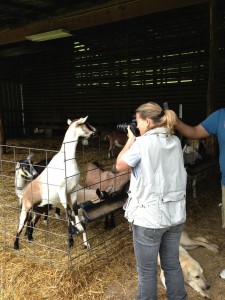It is such a privilege to explore so many Tennessee farms. I have come to love the land and its stewards more than imagined. There is nothing prettier than Tennessee’s green pastures and wooded hills. If you have never had the opportunity to gaze into the curious eyes of a goat, feel the warm nose and sticky, little tongue of a calf, hear the soft, almost purr-like sound hens use to communicate, taste the sweet burst of flavor from a strawberry plucked right off the plant or even smell what a hog farmer smells day after day, appreciation for farm life is just about to fill your soul. Well, at least I hope it will.
Nashville loves food. We know that, but where does Nashville’s food come from?
The first in my Nashville Loves Food introductions is Noble Springs Dairy. I first fell in love with this farm at the East Nashville Farmers Market. The first Noble Springs cheese I ever bought was an alternative to what a lot of southern chefs are serving in mason jars these days. I am forever hooked on their pimento goat cheese spread. The seasonal fruited and herbed chèvre, Harpeth Fleur and Southall Gouda are all beautiful additions to any cheese board. The Nobles also make a delightfully, tangy feta. It holds firm enough for pastas, but not so firm that a vinaigrette does not turn velvet smooth when introduced to this mediterranean favorite. Their yogurt is thinner than a cow’s milk yogurt, but sure does pack a nice punch for ice cream. Last year, I shared a recipe for Frozen Goat Yogurt. Click here for a versatile frozen yogurt recipe. I also used their chèvre in the bruschetta that won silver at the Tomato Art Festival 2013 Recipe Contest. Click here for my greek bruschetta.
The Nobles raise predominately three breeds of goats perfect for milking. Kris Wetherbee wrote these descriptions for a 2002 Mother Earth article:
“You can recognize Alpine goats by their upright ears and long necks. This medium-to-large, hardy breed also milks well. Their coats are two-toned, with black and white the most common color.-Saanensare commonly referred to as the Holstein of the goat world. Noted as heavy milkers, they are often the breed used in commercial dairies. One of the larger breeds, amiable Saanens are usually all white.-Toggenburg coat colors range from fawn to deep chocolate. A medium-size breed known for long lactations, their inquisitive nature can sometimes become quite challenging.”
My Noble Springs relationship began at a market, but Dustin and Justyne truly are a love story! While Dustin grew up in Williamson County, Justyne spent her teenage years in Tonganoxie, Kansas. They first met showing Alpine Goats at the 2003 American Dairy Goat Association National Show in Des Moines, Iowa. It wasn’t long until they discovered they had much more in common than goats. They fell in love! By 2009, their goat farm located minutes from downtown Franklin was well under way with a dairy parlor under construction and a plan for success. Later that year, a Dutch cheese maker taught them the secrets of making delicious goat cheese. The Nobles take pride in their goats’ forage-based diet. Slow pasteurized at 145 degrees, the milk is never mechanically homogenized. A premier southern creamery, Noble Springs milk and cheese are available in numerous retail locations, farmers markets and restaurants!
Sheri O’Neal and Erik Lara, were able to catch the inquisitive little faces of our noble goats last summer. I had so much fun tromping around in the fresh rain and watching these two tell a story through pictures. Dustin and Justyne are such a sweet couple who have certainly captured the heart and palate of so many folks. Later this year, I would like to make a few personal introductions at a series of Nashville Loves Food events. While my story is predominately delivered in prose form, Sheri uses beautiful imagery as her mouthpiece. Find her work at SheriOneal.com. More details on the Nashville Loves Food series are to come. If you would like to stay up to date, please take a moment by clicking the newsletter option on the side bar of my home page.
![]()
